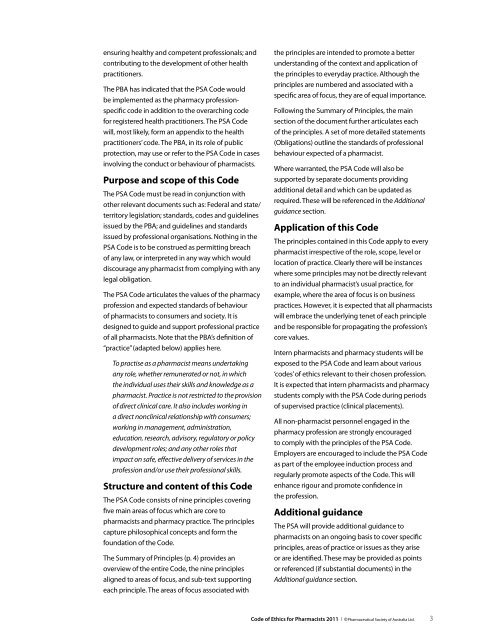code-of-ethics-2011
code-of-ethics-2011
code-of-ethics-2011
Create successful ePaper yourself
Turn your PDF publications into a flip-book with our unique Google optimized e-Paper software.
ensuring healthy and competent pr<strong>of</strong>essionals; andcontributing to the development <strong>of</strong> other healthpractitioners.The PBA has indicated that the PSA Code wouldbe implemented as the pharmacy pr<strong>of</strong>essionspecific<strong>code</strong> in addition to the overarching <strong>code</strong>for registered health practitioners. The PSA Codewill, most likely, form an appendix to the healthpractitioners’ <strong>code</strong>. The PBA, in its role <strong>of</strong> publicprotection, may use or refer to the PSA Code in casesinvolving the conduct or behaviour <strong>of</strong> pharmacists.Purpose and scope <strong>of</strong> this CodeThe PSA Code must be read in conjunction withother relevant documents such as: Federal and state/territory legislation; standards, <strong>code</strong>s and guidelinesissued by the PBA; and guidelines and standardsissued by pr<strong>of</strong>essional organisations. Nothing in thePSA Code is to be construed as permitting breach<strong>of</strong> any law, or interpreted in any way which woulddiscourage any pharmacist from complying with anylegal obligation.The PSA Code articulates the values <strong>of</strong> the pharmacypr<strong>of</strong>ession and expected standards <strong>of</strong> behaviour<strong>of</strong> pharmacists to consumers and society. It isdesigned to guide and support pr<strong>of</strong>essional practice<strong>of</strong> all pharmacists. Note that the PBA’s definition <strong>of</strong>“practice” (adapted below) applies here.To practise as a pharmacist means undertakingany role, whether remunerated or not, in whichthe individual uses their skills and knowledge as apharmacist. Practice is not restricted to the provision<strong>of</strong> direct clinical care. It also includes working ina direct nonclinical relationship with consumers;working in management, administration,education, research, advisory, regulatory or policydevelopment roles; and any other roles thatimpact on safe, effective delivery <strong>of</strong> services in thepr<strong>of</strong>ession and/or use their pr<strong>of</strong>essional skills.Structure and content <strong>of</strong> this CodeThe PSA Code consists <strong>of</strong> nine principles coveringfive main areas <strong>of</strong> focus which are core topharmacists and pharmacy practice. The principlescapture philosophical concepts and form thefoundation <strong>of</strong> the Code.The Summary <strong>of</strong> Principles (p. 4) provides anoverview <strong>of</strong> the entire Code, the nine principlesaligned to areas <strong>of</strong> focus, and sub-text supportingeach principle. The areas <strong>of</strong> focus associated withthe principles are intended to promote a betterunderstanding <strong>of</strong> the context and application <strong>of</strong>the principles to everyday practice. Although theprinciples are numbered and associated with aspecific area <strong>of</strong> focus, they are <strong>of</strong> equal importance.Following the Summary <strong>of</strong> Principles, the mainsection <strong>of</strong> the document further articulates each<strong>of</strong> the principles. A set <strong>of</strong> more detailed statements(Obligations) outline the standards <strong>of</strong> pr<strong>of</strong>essionalbehaviour expected <strong>of</strong> a pharmacist.Where warranted, the PSA Code will also besupported by separate documents providingadditional detail and which can be updated asrequired. These will be referenced in the Additionalguidance section.Application <strong>of</strong> this CodeThe principles contained in this Code apply to everypharmacist irrespective <strong>of</strong> the role, scope, level orlocation <strong>of</strong> practice. Clearly there will be instanceswhere some principles may not be directly relevantto an individual pharmacist’s usual practice, forexample, where the area <strong>of</strong> focus is on businesspractices. However, it is expected that all pharmacistswill embrace the underlying tenet <strong>of</strong> each principleand be responsible for propagating the pr<strong>of</strong>ession’score values.Intern pharmacists and pharmacy students will beexposed to the PSA Code and learn about various‘<strong>code</strong>s’ <strong>of</strong> <strong>ethics</strong> relevant to their chosen pr<strong>of</strong>ession.It is expected that intern pharmacists and pharmacystudents comply with the PSA Code during periods<strong>of</strong> supervised practice (clinical placements).All non-pharmacist personnel engaged in thepharmacy pr<strong>of</strong>ession are strongly encouragedto comply with the principles <strong>of</strong> the PSA Code.Employers are encouraged to include the PSA Codeas part <strong>of</strong> the employee induction process andregularly promote aspects <strong>of</strong> the Code. This willenhance rigour and promote confidence inthe pr<strong>of</strong>ession.Additional guidanceThe PSA will provide additional guidance topharmacists on an ongoing basis to cover specificprinciples, areas <strong>of</strong> practice or issues as they ariseor are identified. These may be provided as pointsor referenced (if substantial documents) in theAdditional guidance section.Code <strong>of</strong> Ethics for Pharmacists <strong>2011</strong> I © Pharmaceutical Society <strong>of</strong> Australia Ltd.3


